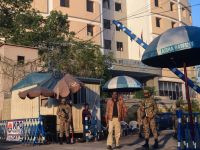Forty two Lower House lawmakers have signed a petition protesting the government plan to hike the price of petrol and other oil derivatives as of early next year, a deputy said on Thursday.
According to Deputy Mahmoud Kharabsheh, the petition is currently being circulated for signatures, and is expected to be presented to House Speaker Abdul Hadi Majali during Sunday's session.
Kharabsheh, who initiated the memo, told the Jordan Times that deputies are dead set against the hike in petrol prices, considering the faltering economic situation in the Kingdom and the disproportionately low income of most citizens.
“Increasing the load or financial burdens on citizens at such a time is not possible,” he said, adding that the government could resort to other measures to compensate for the expected shortfall in revenues.
However, observers see the deputies' motion as part of political pestering between the lawmakers and Prime Minister Ali Abul Ragheb over what they claim was government interference in the House speakership elections.
In early November, Majali had withdrawn from the speakership race following alleged “pressures” from government and security officials.
He later changed his mind following a meeting with His Majesty King Abdullah who reportedly said that the Royal Court would support the candidate of choice of the assembly.
The government has also denied exerting pressure or involvement in the speakership elections.
Following Majali's successful bid at re-election, several deputies twice arranged for face-to-face meetings between the speaker and the premier to clear the air of differences and start afresh.
In a similar move to reconcile the situation between the two parties, the King invited Majali to attend official iftars.
Those who signed the petition against the price hike included all members of Majali's Al Wifaq (reconciliation) Bloc, in addition to the pro-establishment camp and centrists as well as leftist deputies.
“Unfortunately most politicians in Jordan are motivated by personal positions at the expense of national interest,” said a former official.
Senior government officials on Wednesday unveiled plans to hike petrol and oil derivative prices early in 2001 to offset a JD100 million expected shortfall in revenues, and to keep the Kingdom's budget deficit within a six per cent margin.
The officials said the new prices, to be fixed early next year, would have little impact on low-income citizens.
While addressing Parliament to present the JD2.3 billion draft budget for 2001 on Wednesday, Finance Minister Michel Marto also spoke of the necessity to increase oil prices.
Officials said the decision to hike prices was to avoid cutting down on crucial public expenditure for the third consecutive year, and to implement the infrastructure projects needed to attract investors and improve public services, including health and education.
They said the government could either raise the price of oil derivatives or resort to reducing capital expenditure, thus affecting the overall economic cycle, diminishing public services and effectively ending prospects for creating new jobs.
The decision is expected to have a positive impact towards balancing the budget, managing foreign debt and building a progressive economic future.
The controversial increase will principally target petrol in all three variations (regular, super and unleaded); in addition to a slight increase in the price of kerosene, used for heating and sometimes cooking by those of modest income.
The petrol price rise will naturally be accompanied by an increase in taxi fares, and to a lesser extent, public transport.
The officials said the hike was also necessary to follow up on an IMF reform programme, which entails achieving a six percent budget deficit for 2001 in return for loans and debt rescheduling.
“Excuses like IMF conditions should not be used. If they have to abide by the IMF then let the IMF run the country and we would deal with the IMF and not the government from now on,” said Kharabsheh.
He told the Jordan Times that the government should avoid treading on red areas related to the basic livelihood of citizens. “The decision is like a fuse that will trigger the public.
Trespassing on issues related to their livelihood, services and commodities will provoke a reaction,” he warned.
He suggested that the government cut its expenditure in many other domains “including car purchasing,” to avoid a budget deficit.
“I personally will not accept such a decision,” Kharabsheh added.
The sharp rise in world oil prices has strained the Kingdom's finances despite a deal with Iraq, which entails supplying Jordan with most of its energy needs at concessional rates.
If the Lower House rejects the 2001 draft budget, the government might be forced to resign, an unprecedented move.
However, many say it is unlikely that the draft would be rejected. They described the petition as motivated by political bickering, which would be put to bed with most deputies granting their stamp of approval to the draft budget.
King Abdullah on Wednesday met with Majali, and according to officials, stressed the need to endorse the draft budget as presented to Parliament.
The Lower House's financial committee is expected to complete deliberations on the draft budget by the end of December, and a vote would follow at the beginning of the year.
In the meantime, around 29 deputies are also preparing a petition demanding the formation of an anti-normalization committee within Parliament.
Kharabsheh, who also initiated this petition, confirmed that it was in the making and that it would be handed to Speaker Majali on Sunday.
The committee would be charged with combating normalization on the public, legal and legislative levels. It would also work on exerting pressure to scratch the 1994 Jordan-Israel peace treaty, endorsed by a majority of the 1993-1997 Parliament.
Fervent anti-Israeli sentiment has been running high over the past three months, in reaction to the clashes between Israeli troops and Palestinian civilians which has so far left 330 Palestinians dead and many thousands injured, some maimed for life.
( Jordan Times )
By Alia Shukri Hamzeh
© 2000 Mena Report (www.menareport.com)








